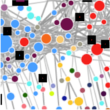
Menu

In 2022, Scott-McGregor celebrates 25 years successful business though the story started in earnest in 1989. This was the year Morley Potter (S-McG’s Managing Partner) exited the successful investment-funded start-up, Challenge Training Ltd, where he had been a founding co-director, completed an MBA at the London Business School and established his first independent consultancy.
With a strong reputation for design, programme management and facilitation – and tired of accumulating fixed overheads – he took the path of working with highly skilled, independent associates and specialists; a successful strategy Scott-McGregor has pursued to this day.
Common threads throughout this time have been the design and delivery of often innovative solutions that meet strategic needs and address organisational problems. These range from culture change to team performance and leadership development. Many assignments have run over extended periods and attracted consistently strong ratings.
Whatever the starting position – from business strategy, finance, sales and account management to team and interpersonal dynamics – the intent has been to improve the ability to achieve strategic goals by addressing the impact and implications of human interactions.
Two important features have become part of the way we approach organisational challenges in recent years.
 Experience has shown how much the strength of culture and collected beliefs affects actions and decisions. Despite their central role in success and failure, the area still attracts surprisingly low investment.
Experience has shown how much the strength of culture and collected beliefs affects actions and decisions. Despite their central role in success and failure, the area still attracts surprisingly low investment.
This is why we are using our Zeta Process ideas to place increased emphasis on culture and beliefs as a key factor for success. These are factors that have thwarted some of the best laid plans, from mergers and restructuring to encouraging people to shift their thinking about leadership. We believe it is important to address the implications head-on.
 We have been exploring using the science of social networks to make visible the critically important ‘hidden’ networks of social interactions within teams and organisations. One benefit is that it quickly shows who are the key opinion-formers, groups or individuals who are central to the informal network and who can support or influence resistance to change and innovation.
We have been exploring using the science of social networks to make visible the critically important ‘hidden’ networks of social interactions within teams and organisations. One benefit is that it quickly shows who are the key opinion-formers, groups or individuals who are central to the informal network and who can support or influence resistance to change and innovation.
